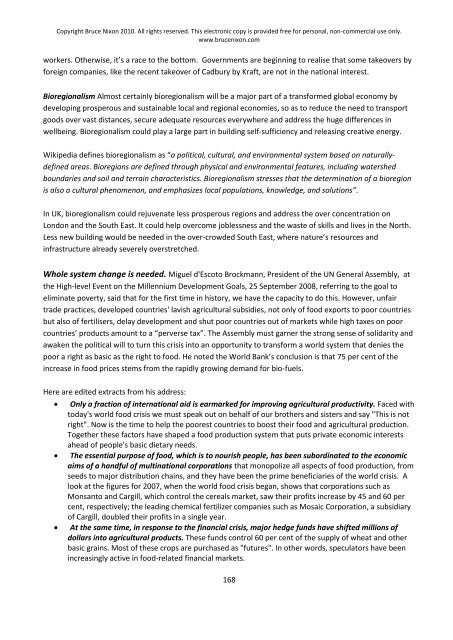A better world is possible - Global Commons Institute
A better world is possible - Global Commons Institute
A better world is possible - Global Commons Institute
You also want an ePaper? Increase the reach of your titles
YUMPU automatically turns print PDFs into web optimized ePapers that Google loves.
Copyright Bruce Nixon 2010. All rights reserved. Th<strong>is</strong> electronic copy <strong>is</strong> provided free for personal, non-commercial use only.<br />
www.brucenixon.com<br />
workers. Otherw<strong>is</strong>e, it’s a race to the bottom. Governments are beginning to real<strong>is</strong>e that some takeovers by<br />
foreign companies, like the recent takeover of Cadbury by Kraft, are not in the national interest.<br />
Bioregional<strong>is</strong>m Almost certainly bioregional<strong>is</strong>m will be a major part of a transformed global economy by<br />
developing prosperous and sustainable local and regional economies, so as to reduce the need to transport<br />
goods over vast d<strong>is</strong>tances, secure adequate resources everywhere and address the huge differences in<br />
wellbeing. Bioregional<strong>is</strong>m could play a large part in building self-sufficiency and releasing creative energy.<br />
Wikipedia defines bioregional<strong>is</strong>m as “a political, cultural, and environmental system based on naturallydefined<br />
areas. Bioregions are defined through physical and environmental features, including watershed<br />
boundaries and soil and terrain character<strong>is</strong>tics. Bioregional<strong>is</strong>m stresses that the determination of a bioregion<br />
<strong>is</strong> also a cultural phenomenon, and emphasizes local populations, knowledge, and solutions”.<br />
In UK, bioregional<strong>is</strong>m could rejuvenate less prosperous regions and address the over concentration on<br />
London and the South East. It could help overcome joblessness and the waste of skills and lives in the North.<br />
Less new building would be needed in the over-crowded South East, where nature’s resources and<br />
infrastructure already severely overstretched.<br />
Whole system change <strong>is</strong> needed. Miguel d'Escoto Brockmann, President of the UN General Assembly, at<br />
the High-level Event on the Millennium Development Goals, 25 September 2008, referring to the goal to<br />
eliminate poverty, said that for the first time in h<strong>is</strong>tory, we have the capacity to do th<strong>is</strong>. However, unfair<br />
trade practices, developed countries' lav<strong>is</strong>h agricultural subsidies, not only of food exports to poor countries<br />
but also of fertil<strong>is</strong>ers, delay development and shut poor countries out of markets while high taxes on poor<br />
countries’ products amount to a “perverse tax”. The Assembly must garner the strong sense of solidarity and<br />
awaken the political will to turn th<strong>is</strong> cr<strong>is</strong><strong>is</strong> into an opportunity to transform a <strong>world</strong> system that denies the<br />
poor a right as basic as the right to food. He noted the World Bank’s conclusion <strong>is</strong> that 75 per cent of the<br />
increase in food prices stems from the rapidly growing demand for bio-fuels.<br />
Here are edited extracts from h<strong>is</strong> address:<br />
<br />
<br />
<br />
Only a fraction of international aid <strong>is</strong> earmarked for improving agricultural productivity. Faced with<br />
today's <strong>world</strong> food cr<strong>is</strong><strong>is</strong> we must speak out on behalf of our brothers and s<strong>is</strong>ters and say "Th<strong>is</strong> <strong>is</strong> not<br />
right". Now <strong>is</strong> the time to help the poorest countries to boost their food and agricultural production.<br />
Together these factors have shaped a food production system that puts private economic interests<br />
ahead of people's basic dietary needs.<br />
The essential purpose of food, which <strong>is</strong> to nour<strong>is</strong>h people, has been subordinated to the economic<br />
aims of a handful of multinational corporations that monopolize all aspects of food production, from<br />
seeds to major d<strong>is</strong>tribution chains, and they have been the prime beneficiaries of the <strong>world</strong> cr<strong>is</strong><strong>is</strong>. A<br />
look at the figures for 2007, when the <strong>world</strong> food cr<strong>is</strong><strong>is</strong> began, shows that corporations such as<br />
Monsanto and Cargill, which control the cereals market, saw their profits increase by 45 and 60 per<br />
cent, respectively; the leading chemical fertilizer companies such as Mosaic Corporation, a subsidiary<br />
of Cargill, doubled their profits in a single year.<br />
At the same time, in response to the financial cr<strong>is</strong><strong>is</strong>, major hedge funds have shifted millions of<br />
dollars into agricultural products. These funds control 60 per cent of the supply of wheat and other<br />
basic grains. Most of these crops are purchased as "futures". In other words, speculators have been<br />
increasingly active in food-related financial markets.<br />
168
















